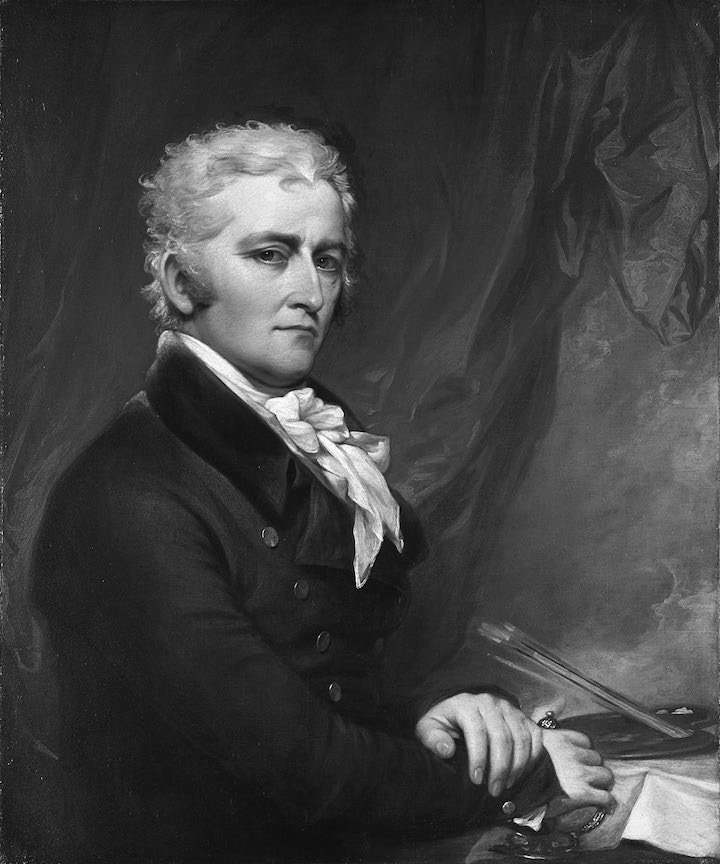To John Jay from John Trumbull, 21 July 1796
From John Trumbull
Rochefort 21st. July 1796.
Dear Sir.
Your Favor of the 12th. December,1 is the last I have had the Honour to receive from you, this I received and answered on the 6th. March;—2 I have since received a number of Letters from America, through Mr Pinckney, which convince me that I have not been so entirely forgotten by my friends as I supposed.
I embark this Afternoon for the North, having terminated the Business which has kept me here since November in a manner that I hope will prove successful— This goes by a Brig to Baltimore which I have loaded with Brandy, and as I suppose tippling is not out of fashion, I hope to be well paid for the trouble of sending it
The Prospect, or rather the Certainty of the Crop of Wheat &c. in this Country is most abundant.— Since I am here the Assignats have followed their elder brother Continental Money to the Grave, and given a fine Subject, for a French Mc. Fingal—3 they are succeeded by Mandats at 30 for 1—which like our 40 for 1 Money, have but a feeble & sickly existence, and will soon follow the others of the Family to Oblivion—4 As all these illusory Systems Vanish, & Coin reappears, plenty follows.—& you may now buy—nay I do buy for my Vessels excellent Beef at 5 1/2 sous pr. pound.—best Ship Bread at 40lt pr Ct.5 & all other provisions in proportion.— Many of our Countrymen suffer extremely by this change—& I am told that late in May, Flour was still sold in New York at 13 or 14 Doll[ar]s pr Barrel, while in no Port of Europe could two thirds of that price be found.— As your State wins or loses more on these Occasions than any other, I take the liberty to write this to you in the hope that our friends at least will beware of harm.
The Armies of France are every where successful— a considerable part of Italy is in their possession— at home Good Order and Quiet reign to a considerable Degree,— the various Schemes of public Credit, which necessity has dictated must occasion however much Evil so long as the continuance of the War requires such immense Expenses— I believe the Government are sensible of this, & sincerely desirous of Peace as the only means of restoring entirely, what ought to be the End of all Government, Domestic & Individual Prosperity & enjoyment. I beg you to present my respect to Mrs. Jay, and to accept the Assurances of my sincere Respect & friendship.
Jno. Trumbull
ALS, NNC (EJ: 07205). Addressed: “His Excellency John Jay Esqr / Governor of the State of / New York / New York”; with notation: “By the Eliza Johnson /Capt. Crozier / to Baltimore”. Marked: “Ship 29 / Paid”. Endorsed. The brig Eliza Johnson carrying brandy and captained by Crozier, left the Charente River in France on 12 Aug. and arrived in Hampton Road on 16 Sept. and Baltimore on 24 Sept. 1796. Claypoole’s American Daily Advertiser (Philadelphia), 26 Sept.; Gazette of the United States (Philadelphia), 27 Sept.; Boston Gazette, 3 Oct. 1796.
1. Letter not found.
3. On the collapse of the Continental currency, and the new emission currency issued to replace it at a rate of 40 for 1, see Circular Letter from Congress to their Constituents, [13 Sept. 1779], and notes, , 1: 667—78. The satirical epic poem M’Fingal (or McFingal), written by JT’s cousin John Trumbull, poet, satirist, and polemicist, was first published in 1776 in one canto, but republished in 1782 with three additional cantos, the fourth of which, entitled The Vision, included critical commentary on paper money. M’Fingal: a modern epic poem, in four cantos (Hartford, 1782; , series 1, no. 17752).
4. Assignats were a form of paper currency backed by the value of confiscated lands issued by the National Assembly in France from 1789 to 1795. Over time the assignats lost most of their value, and in March 1796 the Directory replaced them with mandats, a currency in the form of land warrants. Assignats were exchangeable for mandats at a rate of 30 for 1, but mandats also quickly failed, and France returned to metallic currency. JJ’s circular letter cited in note 2 above was translated into

John Trumbull, self-portrait, c. 1802. Oil on canvas. (Yale University Art Gallery)
5. That is, forty livres tournois per hundredweight.

![University of Virginia Press [link will open in a new window] University of Virginia Press](/lib/media/rotunda-white-on-blue.png)
